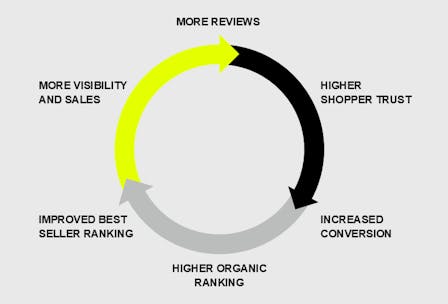Why Reviews Matter: The Hidden Engine Behind Amazon Rankings
When we think of what drives success on Amazon, we often focus on pricing, ad spend, or search volume. But one of the most powerful and underrated levers is also the simplest: product reviews.
Our team at Front Row set out to understand just how much impact reviews alone can have on performance, using a product in the home category as our test case. We didn’t change the price. We didn’t touch the listing copy or ramp up ads.
We simply increased the review count, and tracked what happened next.
The Experiment
To isolate the impact of reviews, we ensured that all other factors remained constant.
As said, we didn’t modify pricing or the listing content, and we didn’t run any promotions or paid ads. In fact, all advertising for the brand had been turned off since Q4 2024.
The only change we made was increasing the product’s review count from 200 to over 500.
The outcome was impressive.

Best Seller Rank (BSR)
BSR improved significantly, jumping from #26 to #8.
Organic Ranking
Organic ranking rose from an average position of 6.5 to 2.1 for top keywords.
Conversion Rate (CVR)
CVR more than doubled, from 6.6% to 14.3%.
How Reviews Trigger a Performance Flywheel
The most surprising part? The product’s organic ranking improved before we saw any movement in conversion rate or BSR. Why?
Amazon treated the increase in reviews as a trust signal, enough to warrant a boost in organic visibility. It’s almost as if Amazon took a “leap of faith”, assuming that higher reviews would eventually translate into stronger performance. This was not an immediate conversion win, but rather a calculated bet on the power of social proof.
As expected, stronger reviews led to better conversion rates, which resulted in more sales and, ultimately, a better BSR. The result was a classic performance flywheel.

Let Social Proof Work Smarter
For many brands, review generation is often seen as a secondary initiative. But this test reinforces that reviews are a growth engine. Amazon’s algorithm responds to an increase in reviews with a temporary boost in visibility, betting that social proof will lead to higher conversions. Over time, this results in long-term, sustainable improvements in rankings and sales.
If you’re underinvesting in your review strategy, it’s time to rethink it. Reviews are often the differentiator in competitive categories, driving lasting organic growth.
At Front Row, we help brands uncover the real performance drivers. If you’re wondering how your review count could be holding you back or how to scale reviews while staying compliant, let’s talk.
